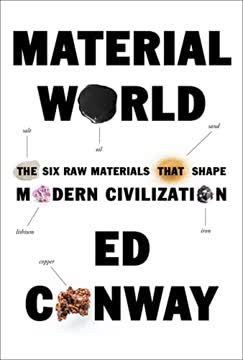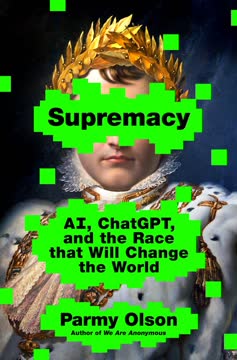Key Takeaways
1. States and Corporations: Artificial Agents Shaping Our World
The name for these strange creatures is states and corporations.
Artificial Persons. States and corporations are not merely collections of individuals; they are artificial entities with agency, capable of acting in the world independently of their members' immediate desires. This agency stems from their ability to make decisions and enforce them, often on a superhuman scale.
Mechanical Fictions. These entities function through established mechanisms and procedures, resembling machines more than organic beings. This mechanical nature allows them to endure over time, independent of the individuals who constitute them.
Superagency. The power of states and corporations lies in their ability to act, to shape the world in ways that individual humans cannot. This "superagency" allows them to mobilize resources, wage wars, and drive economic growth, but also carries the potential for immense destruction.
2. Group Minds: Collective Intelligence and Its Perils
Groups appear to be able to think things that are not thought by their individual members.
Emergent Thought. Groups can possess a collective intelligence that transcends the individual thoughts of their members. This "group mind" can lead to both wisdom and folly, depending on how the group is structured and managed.
Discursive Dilemma. The "discursive dilemma" illustrates how a group can arrive at a conclusion that contradicts the individual beliefs of its members. This highlights the artificiality of group decision-making and the potential for unintended consequences.
Groupthink vs. Wisdom. While groups can be sources of collective wisdom, they are also susceptible to "groupthink," where conformity and a desire for harmony stifle critical thinking. Harnessing the intelligence of groups requires careful management and a commitment to independent thought.
3. The State's Burden: Debt, War, and Moral Responsibility
The state is meant to be a uniquely powerful, uniquely reliable institution. But it’s not.
Carrying the Weight. States bear burdens that individuals cannot, such as national debt and the responsibility for waging war. This capacity stems from their durability and their ability to mobilize resources over long periods.
Moral Hazard. The state's ability to shoulder these burdens creates a "moral hazard," where individuals may act recklessly knowing that the state will ultimately bear the consequences. This can lead to irresponsible fiscal policies and a willingness to engage in violence.
Accountability Dilemma. Attributing actions to the state obscures individual responsibility, making it difficult to hold anyone accountable for the state's misdeeds. This creates a tension between the need for collective action and the importance of individual moral responsibility.
4. From Tribes to Empires: The Evolution of Human Organization
We are the only species that can organise our existence around our imaginations.
Cognitive Revolution. The ability to create and share "fictions" – imagined communities and shared beliefs – is a uniquely human trait that has enabled us to organize ourselves into increasingly complex societies. This cognitive revolution allowed humans to cooperate on a scale unmatched by any other species.
Agricultural Revolution. The shift to settled agriculture led to the rise of cities and states, requiring new forms of organization and governance. This marked a transition from small, face-to-face communities to larger, more impersonal societies.
Scientific Revolution. The scientific revolution transformed our understanding of the natural world, leading to unprecedented technological advancements and economic growth. This revolution also gave rise to modern states and corporations, which have reshaped the human condition.
5. The Great Transformation: Economic Growth and Its Discontents
I call this ‘the First Singularity’.
Exponential Growth. The past few centuries have witnessed an unprecedented explosion of economic growth, population, and technological innovation. This "great transformation" has lifted billions out of poverty and transformed the human condition.
Uneven Distribution. The benefits of this transformation have not been evenly distributed. Inequality has widened, and many parts of the world have been left behind. This raises questions about the sustainability and ethical implications of our current economic model.
Environmental Costs. The great transformation has come at a significant environmental cost, leading to climate change, resource depletion, and biodiversity loss. This poses an existential threat to humanity and requires a fundamental rethinking of our relationship with the natural world.
6. You Didn't Build That: The State's Role in Innovation
If you’ve got a business, you didn’t build that. Somebody else made that happen.
The Entrepreneurial State. The state plays a crucial role in driving innovation, often taking on the high-risk, long-term investments that private companies are unwilling to make. This "entrepreneurial state" has been responsible for many of the most transformative technologies of our time.
Public vs. Private. While private enterprise is essential for commercializing innovations and bringing them to market, the state provides the foundational research and infrastructure that make these innovations possible. This highlights the importance of a strong public-private partnership.
Beyond Market Logic. The state's ability to act outside of market logic allows it to pursue goals that are not driven by profit, such as national security, scientific discovery, and social welfare. This broader perspective is essential for addressing complex challenges that require long-term planning and collective action.
7. Beyond the State: AI, Corporations, and the Future of Power
Ultimately, a world of states, corporations and artificial intelligence machines will require us to make some hard choices.
The AI Revolution. The rise of artificial intelligence presents both opportunities and challenges for states and corporations. AI has the potential to enhance productivity, solve complex problems, and improve human lives.
Competition for Control. States and corporations are increasingly competing for control of AI technology, leading to new forms of geopolitical and economic rivalry. This competition raises questions about the future of power and the potential for AI to exacerbate existing inequalities.
Cooperation or Exclusion. The greatest risk lies in the possibility that states, corporations, and AI systems will form new alliances that exclude human beings from their considerations. This requires a renewed focus on human-centered values and a commitment to ensuring that AI serves the common good.
8. The Second Singularity: Navigating a World of Inhuman Agents
We are going to be living in a world of human-like machines, built by machine-like versions of human beings.
The Inhuman Future. The convergence of states, corporations, and AI is creating a world increasingly shaped by inhuman agents. This requires us to make difficult choices about what kind of artificiality we can live with.
Picking Sides. We must decide which of these artificial agents gives us the best chance of preserving our humanity and achieving our goals. This requires a critical assessment of their values, their priorities, and their potential impact on our lives.
The Human Choice. The future is not predetermined. It is up to us to shape the relationship between humans and machines, to ensure that technology serves humanity rather than the other way around. This requires a renewed commitment to human values, democratic governance, and a sustainable future.
Last updated:
Review Summary
The Handover explores the transfer of control from individuals to larger entities like governments, corporations, and AI. Readers find it thought-provoking, offering unique perspectives on states and corporations as artificial agents. Some praise Runciman's writing style and analysis, while others find it dense and repetitive. The book challenges readers to consider the balance between collective power and individual autonomy in our evolving world. Despite mixed opinions on its execution, many agree it raises important questions about our future relationship with AI and existing power structures.
Similar Books










Download PDF
Download EPUB
.epub digital book format is ideal for reading ebooks on phones, tablets, and e-readers.




